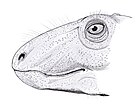Eutheriodontia: Difference between revisions
No edit summary |
Rescuing 1 sources and tagging 0 as dead. #IABot (v1.5.3) |
||
| Line 13: | Line 13: | ||
}} |
}} |
||
'''Eutheriodontia''' is a [[clade]] of [[therapsid]]s that includes [[therocephalian]]s and [[cynodont]]s. The clade was erected in 1986, and a close relationship between therocephalians and cynodonts has been recognized for many years. Therocephalians and cynodonts are thought to have diverged in the [[Middle Permian]], and each group independently evolved mammal-like features, including a [[secondary palate]] and the loss of a [[postorbital bar]] (these features were retained in mammals, which are considered a [[Synapomorphy|derived]] group of cynodonts). Mammalian features that both groups inherited from a common ancestor include the loss of teeth on the [[palate]], the expansion of the epipterygoid bone at the base of the skull (an area called the [[alisphenoid]] in mammals), and the narrowing of the [[skull roof]] to a narrow [[sagittal crest]] running between large [[temporal fenestrae|temporal openings]].<ref name=RS01>{{cite journal |last=Rubidge |first=B.S. |author2=Sidor, C.A. |year=2001 |title=Evolutionary patterns among Permo-Triassic therapsids |journal=Annual Review of Ecology, Evolution, and Systematics |volume=32 |pages=449–480 |url=http://www11.cac.washington.edu/burkemuseum/collections/paleontology/sidor/Rubidge_Sidor2001.pdf |doi=10.1146/annurev.ecolsys.32.081501.114113}}</ref> |
'''Eutheriodontia''' is a [[clade]] of [[therapsid]]s that includes [[therocephalian]]s and [[cynodont]]s. The clade was erected in 1986, and a close relationship between therocephalians and cynodonts has been recognized for many years. Therocephalians and cynodonts are thought to have diverged in the [[Middle Permian]], and each group independently evolved mammal-like features, including a [[secondary palate]] and the loss of a [[postorbital bar]] (these features were retained in mammals, which are considered a [[Synapomorphy|derived]] group of cynodonts). Mammalian features that both groups inherited from a common ancestor include the loss of teeth on the [[palate]], the expansion of the epipterygoid bone at the base of the skull (an area called the [[alisphenoid]] in mammals), and the narrowing of the [[skull roof]] to a narrow [[sagittal crest]] running between large [[temporal fenestrae|temporal openings]].<ref name=RS01>{{cite journal |last=Rubidge |first=B.S. |author2=Sidor, C.A. |year=2001 |title=Evolutionary patterns among Permo-Triassic therapsids |journal=Annual Review of Ecology, Evolution, and Systematics |volume=32 |pages=449–480 |url=http://www11.cac.washington.edu/burkemuseum/collections/paleontology/sidor/Rubidge_Sidor2001.pdf |doi=10.1146/annurev.ecolsys.32.081501.114113 |deadurl=yes |archiveurl=https://web.archive.org/web/20120321142923/http://www11.cac.washington.edu/burkemuseum/collections/paleontology/sidor/Rubidge_Sidor2001.pdf |archivedate=2012-03-21 |df= }}</ref> |
||
==References== |
==References== |
||
Revision as of 08:38, 25 September 2017
| Eutheriodontia Temporal range: Middle Permian-Holocene,
| |
|---|---|

| |
| Life restoration of the therocephalian Microgomphodon | |

| |
| Life restoration of the cynodont Tritylodon | |
| Scientific classification | |
| Domain: | Eukaryota |
| Kingdom: | Animalia |
| Phylum: | Chordata |
| Clade: | Synapsida |
| Clade: | Therapsida |
| Clade: | Theriodontia |
| Clade: | Eutheriodontia Hopson & Barghusen, |
| Groups | |
Eutheriodontia is a clade of therapsids that includes therocephalians and cynodonts. The clade was erected in 1986, and a close relationship between therocephalians and cynodonts has been recognized for many years. Therocephalians and cynodonts are thought to have diverged in the Middle Permian, and each group independently evolved mammal-like features, including a secondary palate and the loss of a postorbital bar (these features were retained in mammals, which are considered a derived group of cynodonts). Mammalian features that both groups inherited from a common ancestor include the loss of teeth on the palate, the expansion of the epipterygoid bone at the base of the skull (an area called the alisphenoid in mammals), and the narrowing of the skull roof to a narrow sagittal crest running between large temporal openings.[1]
References
- ^ Rubidge, B.S.; Sidor, C.A. (2001). "Evolutionary patterns among Permo-Triassic therapsids" (PDF). Annual Review of Ecology, Evolution, and Systematics. 32: 449–480. doi:10.1146/annurev.ecolsys.32.081501.114113. Archived from the original (PDF) on 2012-03-21.
{{cite journal}}: Unknown parameter|deadurl=ignored (|url-status=suggested) (help)






